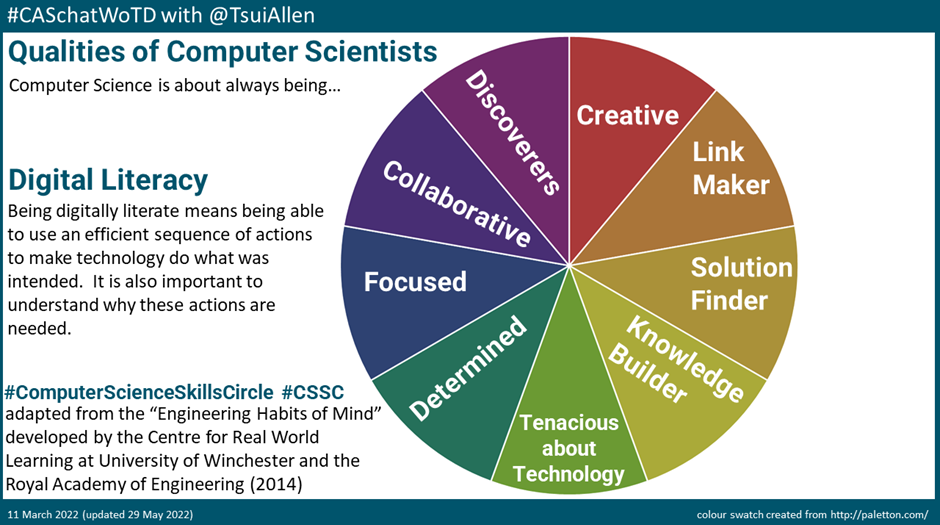09 October 2022
We are all teachers of technology…


The opening question of the Twitter: @TeacherTapp daily poll in early October 2022 about sharing resources got me thinking about why I freely share anything I've written or created in the line of duty in the way that I do. Well, first and foremost it is principally because I firmly believe irrespective of which Key Stage, age range or school setting that any teacher works in, we are all teachers of technology. We might not be explicitly be teaching all of the life-long skills as identified in the “Engineering Habits of Mind” developed by the Centre for Real World Learning at University of Winchester and the Royal Academy of Engineering (2014) but there will be some aspect of each of our teaching practices which touches on one, some or all of these attributes.
Professional Development delivered virtually
The @TeacherTapp poll question did make me realise too how as subject leaders in Primary schools, the arrangements to collaborate with colleagues will be dependent on subject as well as other factors. Since I started working in schools in 2010 I have attended many training sessions which have focused on the core subjects. I have no objection to this and wholly understand the necessity of doing so given the priorities of every Primary school. It has however reminded me that given time constraints on all of us, by me freely sharing resources is a means of being able to provide a level of connection and support for colleagues who may or may not have the professional confidence to teach Computing. It was presenting a workshop to ECTs which also made me realise that symbiotic benefit of sharing ideas with those who will never be expected to teach Computing given their own specialist roles since it sparks a fusion of new cross-curricular collaborative teaching and learning opportunities.
Beyond subject boundaries
In my mind therefore, I believe it is important as an active member of the Computing at School Community of Practice, that whatever our subject knowledge, practice and professional experiences, ‘we’ reach out and share more widely. Social media has been instrumental in enabling the teaching community to do this. It was indeed when I attended the Raspberry Pi Certified Educators workshop in May 2016 when Twitter: @LegoJames to be more active on social media and become a member of the Computing at School Community.
Computing at School
By virtue of the fact that you’re scrolling by this blog means that you are either already familiar with the Computing at School or maybe this is your first visit being newly appointed to the role of teaching Computing. Some may be embarking on their teaching careers and heard their lecturers sign post membership or association with this incredible community. Some may be industry experts who have only recently discovered this platform. Irrespective of the path that brings you to this blog, welcome.
Since taking on the role of leading Computing at the amazing school I work for in Summer 2020, one of the frequently asked questions is ‘what’s the basis of your why?’ My own journey with the Computing at School started in 2016 where I met those involved with this grassroots organisation during the Raspberry Pi Certified Educators workshop that May in Newcastle. CAS as it is more familiarly known is supported by BCS, the Chartered Institute for IT. CAS describes itself as a grassroots members based organisation or Community of Practice. Formed by a body of volunteers in 2012, CAS has become a very influential network of Computing or Computer Science teachers as well as other associated experts from across the educational technology sector. CAS is recognised by the UK Council of Subject Associations as one of three organisations representing Computing. Notably, CAS is the only organisation of the three which does not charge a subscription for membership.
What has consistently impressed me since joining CAS has been how community spirited its members are with freely sharing ideas. It has been though my associations with CAS that I have had the most amazing memory making moments for the children at the school I work for. Whether it has been the opportunity to invite international delegations to my school, being a speaker on the main Arena stage opening the BETT Show, lifting the limits on learning about physical computing…
@TsuiAllen on Twitter
Twitter is my preferred medium of social media since it allows me to exercise my stream of consciousness. I have actually had a Twitter account since August 2012 as Twitter @natachakennedy sign-posted me and my fellow students to during my PGCE year. However, I had to have a ctrl-alt-del moment at the end of 2019. Because I didn’t reboot my Twitter account until after the period for restoring my entire history of previous posts and contacts had expired, my account appears to have been only opened since the eve of the beginning of 2020. It was during the time that the World went weird I decided to curate a social media persona focusing on the irreverent and frivolous rather than attempting to engage with controversial click-bait.
In the real World, I have been teaching at the school I work for since that Tim Peake began his mission aboard the International Space Station in December 2015. However, where Tim Peake returned to Earth six months later, my mission at the amazing school that I work for continues. I was a Class Teacher at the school until Summer 2020 when I was offered the opportunity to lead Computing. With a three form entry, to provide non-contact, planning and preparation release time for the Classroom based colleagues, Computing is part of a provision lead by specialist teachers working across the whole school. This means that I exclusively teach Computing to everybody from Reception to Year 6.
For those who follow me on Twitter will know that I am an open source kind of individual as I freely share pretty much everything that I ever produce as part of my teaching practice. In part it is to reciprocate the ethos of CAS sharing resources and ideas for free. I have no ambition to build an entrepreneurial empire and commercialise or monetise the artefacts I produce. The symbiotic professional gain I personally get from peer review feedback is worth more than any fiscal reward. It is also in part my long succession strategy to provide immediate colleagues and the wider Computer Science teaching community resources that others can feel confident enough to use in their classrooms. This is where social media and the CAS community has been a real asset enabling those schools with little or limited subject knowledge specialism to have access to a network of support and teach computing to the highest standards possible.
Sunday Scaries
Based on my own interactions of Twitter, one of the notable patterns is the peak in demand for sharing resources and teaching ideas on a Sunday. This is often associated with what has become recognised by many as the ‘Sunday scaries’ or the sense of impending doom as the new working week looms. I am happy to share my resources every #ShareStuffSunday hosted by Twitter’s @i_teach_things simply because social media provides me with what I consider a “safe space” to almost pre-published my resources before I put them into use. What I mean is that if there is an audience of peers who are able to comment or feedback on what I share, it helps me focus on its subsequent use in the classroom. I would much rather have my work openly critiqued by the wider teaching community since it also prepares me for similar conversations and meetings I expect from or with senior colleagues when they conduct their management scrutinies. By sharing my resources openly to peer review means being able to evaluate my own practice as well as enabling my resources to be openly accessible for accounting and scrutiny purposes for when “An Inspector Calls…”
Simply selfish intention…
Whilst these ideas of professionally supporting others, peer review feedback as well as being openly accountable for scrutiny might be laudable to many, the underlying practical reason for sharing is just because I can. Having subscribed to both Microsoft OneDrive and Google Drive since 2016 means being able to simply open the sharing link to any content I create and post the link as a message on Twitter, upload the file to the Computing at School website or since the end of 2020 posted as part of my @Wakelet collection. Being a non-classroom based teacher means it is more practical to be able to openly access the files I want or need to use on a day to day basis without having to go through the increasingly complex and time consuming steps of password authentication. By openly sharing my files too means establishing a virtual trail of what I have been working on so in the event I need to refer back to a file, I am able to always easily access a copy.
Some might suggest that such generosity is foolish given the quality of some of the resources I create or material I write might have some commercial value if I were to ever decide or choose to sell them. Whilst I am pleased for those across the wider teaching community who extend their classroom expertise beyond their school and offer consultancy or provide their resources along a more mercantile model (whether by actual monetary exchange or ‘wish lists’ fulfilment), I simply personally prefer not to do that. For me, commercialising what I create and write adds administrative complications, contradicting my underlying principle of wanting to improve the quality of teaching and learning Computing for everyone everywhere.
Thank you for reading.








Discussion
Please login to post a comment
You’ve shared so many great quality resources Allen - thank you. Interesting read - thanks for sharing!
Thanks for sharing all those great thoughts Allen. I must have met you at the Picademy in Newcastle then all these years ago as I ran it. Great to see you were inspired to join CAS from that event.